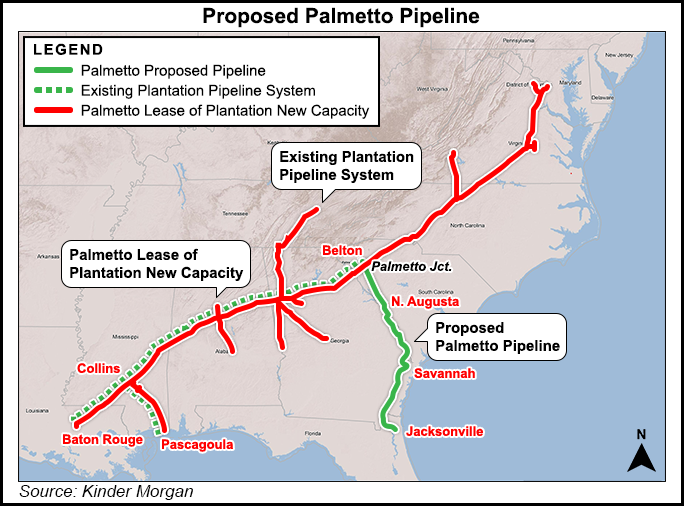GA Bill Halts Products Pipeline, But NatGas Projects Expected to Be Unaffected
Kinder Morgan Inc. (KMI) has indefinitely suspended construction of its $1 billion Palmetto Pipeline after the Georgia General Assembly passed a moratorium on eminent domain, but the legislation is unlikely to impact natural gas projects in the state.

The Palmetto Pipeline, designed to move refined petroleum products from the Gulf Coast to South Carolina, Georgia and Florida, faced strong opposition in Georgia, prompting state legislators to pass HB 1036 by a 116-48 vote on March 22.
The bill, which awaits Republican Gov. Nathan Deal’s signature, places a moratorium on eminent domain powers for petroleum pipeline projects until June 30, 2017. The moratorium will “provide the General Assembly with time to study the need for any changes to land use controls or restrictions related to pipeline companies seeking to deliver petroleum to residents of this state or other states.”
KMI issued a notice this week that the company “has suspended further work on the Palmetto Pipeline project, following the unfavorable action by the Georgia legislature regarding eminent domain authority and permitting restrictions for petroleum pipelines. While this legislative action was disappointing, we remain committed to providing customized transportation solutions to our customers.”
The Georgia bill is unlikely to affect interstate natural gas pipeline projects in the state, such as Sabal Trail Transmission LLC.
“The bill specifically applies only to petroleum pipelines,” said Dave Conover, KMI’s VP of corporate communications. “For interstate natural gas pipelines, the FERC certificate process and the preemption contained in the Natural Gas Act remain intact and legislation such as this would not be a threat to those projects.”
The Georgia Department of Transportation had already denied an application requesting a certificate of public convenience and necessity for Palmetto, a decision that was upheld in court.
Conover said the company was “proceeding with negotiated transactions with landowners” before the Georgia legislation, which, aside from suspending eminent domain powers, further prohibited any state agency from issuing any permit or license for a petroleum pipeline while the moratorium is in effect.
Conover said KMI still plans to move forward with other projects in Georgia, including the Elba Island liquefied natural gas terminal in Chatham County, GA, which recently received a favorable environmental assessment from the Federal Energy Regulatory Commission (see Daily GPI, Feb. 8).
Natural gas and petroleum projects across the country have faced increased obstructionism in recent years, partly driven by a “keep it in the ground” movement aimed at stopping fossil fuel development (see Shale Daily, Nov. 2, 2015), but Conover characterized the action by the Georgia legislature as localized and project-specific.
“This is an unfortunate legislative action based on a particular state legislative climate at the moment,” Conover said. “I don’t see other legislatures making the same mistake.”
© 2024 Natural Gas Intelligence. All rights reserved.
ISSN © 1532-1231 | ISSN © 2577-9877 | ISSN © 1532-1266 |
